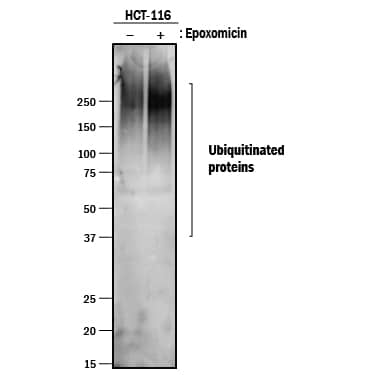Human Ubiquitin Antibody
Bio-Techne includes R&D Systems | Catalog # A-106

Discontinued Product
A-106 has been discontinued and is replaced by
A-104.
Key Product Details
Species Reactivity
Validated:
Human
Applications
Immunoprecipitation, Western Blot
Label
Unconjugated
Antibody Source
Monoclonal Mouse IgG1 Clone # FK2
Product Summary for Human Ubiquitin Antibody
Immunogen
Human Ubiquitin
Specificity
This antibody will recover mono- and polyubiquitinated proteins in I.P. applications. This antibody detects mono- and polyubiquitinated proteins in Western blots.
Clonality
Monoclonal
Host
Mouse
Isotype
IgG1
Scientific Data Images for Human Ubiquitin Antibody
20 µg of cell lysates produced from HCT-116 cells ± 5 uM epoxomicin treatment (4 hours) were resolved on a 4-20% SDS-PAGE gel. Western blots were developed using PVDF membranes and A-106 anti-ubiquitin primary antibody at 0.5 µg/ml followed by HRP-labeled anti-mouse (R&D Systems # HAF007) secondary antibody at 1:2000 dilution. Monoubiquitin and polyubiquitinated proteins were easily visualized with a 10 second exposure using E.C.L. reagents.
Applications for Human Ubiquitin Antibody
Application
Recommended Usage
Immunoprecipitation
Western Blot
0.1-0.5 µg/mL
Sample: HCT‑116 human colorectal carcinoma cell line
Sample: HCT‑116 human colorectal carcinoma cell line
Please Note: Optimal dilutions of this antibody should be experimentally determined.
Formulation, Preparation, and Storage
Purification
Antigen Affinity-purified
Formulation
Boston Bio will fill in the Formulation info
Shipping
The product is shipped at ambient temperature. Upon receipt, store it immediately at the temperature recommended below.
Stability & Storage
Store the unopened product at -20 °C. Use a manual defrost freezer and avoid repeated freeze-thaw cycles. Storage below -20 °C is not recommended. Do not use past expiration date.
Background: Ubiquitin
References
Haas A.L. & Bright P.M. (1985) J. Biol. Chem 260: 12464 Guarino L.A. et al. (1995) Cell 80: 301 Takada K. et al. (1995) Eur. J. Biochem. 233: 42
Alternate Names
UBB
Gene Symbol
UBB
Additional Ubiquitin Products
Product Documents for Human Ubiquitin Antibody
Product Specific Notices for Human Ubiquitin Antibody
Not for use in humans
For research use only
